- Clone
- HMHV-1B18 (See other available formats)
- Regulatory Status
- RUO
- Other Names
- Herpes virus entry mediator, TR2, tumor necrosis factor receptor like 2, TNFRSF14, HVEM
- Isotype
- Armenian Hamster IgG
- Ave. Rating
- Submit a Review
- Product Citations
- publications
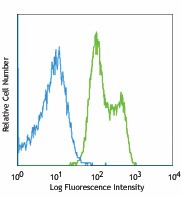
-

C57BL/6 splenocytes stained with HMHV-1B18 PE
| Cat # | Size | Price | Save |
|---|---|---|---|
| 136303 | 25 µg | ¥26,840 | |
| 136304 | 100 µg | ¥66,880 |
Herpes Virus Entry Mediator (HVEM, TR2) is a type I transmembrane protein of TNF-receptor superfamily. This receptor was identified as a cellular mediator of herpes simplex virus (HAS) entry. Binding of HSV viral envelope glycoprotein D to this receptor has been shown to be part of the viral entry mechanism. It is expressed on most cell types, including T cells, B cells, monocytes, neutrophils, and dendritic cells. It is also found in brain, heart, kidney, liver, and other organs. The ligands of HVEM are LIGHT, BTLA, LTα, and CD160. HVEM activates NF-kB through the TNF-related cytokine LIGHT to serve as a costimulatory pathway during T cell activation. HVEM also functions as a ligand for the Ig superfamily members B and T lymphocyte attenuator (BTLA) and CD160 to deliver a coinhibitory signal and limit inflammatory responses initiated by T cells. HVEM plays an important role in regulating lymphocyte activation and homeostasis in immune responses.
Product DetailsProduct Details
- Verified Reactivity
- Mouse
- Antibody Type
- Monoclonal
- Host Species
- Armenian Hamster
- Immunogen
- Mouse HVEM-hIgG1Fc fusion protein
- Formulation
- Phosphate-buffered solution, pH 7.2, containing 0.09% sodium azide.
- Preparation
- The antibody was purified by affinity chromatography, and conjugated with PE under optimal conditions.
- Concentration
- 0.2 mg/ml
- Storage & Handling
- The antibody solution should be stored undiluted between 2°C and 8°C, and protected from prolonged exposure to light. Do not freeze.
- Application
-
FC - Quality tested
- Recommended Usage
-
Each lot of this antibody is quality control tested by immunofluorescent staining with flow cytometric analysis. For flow cytometric staining, the suggested use of this reagent is ≤ 1.0 µg per 106 cells in 100 µl volume. It is recommended that the reagent be titrated for optimal performance for each application.
- Excitation Laser
-
Blue Laser (488 nm)
Green Laser (532 nm)/Yellow-Green Laser (561 nm)
- Product Citations
-
- RRID
-
AB_1967105 (BioLegend Cat. No. 136303)
AB_2203830 (BioLegend Cat. No. 136304)
Antigen Details
- Structure
- A type I transmembrane protein of TNF-receptor superfamily.
- Distribution
-
It is expressed on most cell types, including T cells, B cells, monocytes, neutrophils, and dendritic cells. It is also found in brain, heart, kidney, liver, and other organs.
- Function
- Play an important role in regulating lymphocyte activation and homeostasis in immune responses.
- Ligand/Receptor
- LIGHT, BTLA, LTα, CD160
- Cell Type
- B cells, Dendritic cells, Neutrophils
- Biology Area
- Cell Adhesion, Cell Biology, Immunology, Signal Transduction
- Molecular Family
- Adhesion Molecules, CD Molecules
- Antigen References
-
1. Fan Z, et al. 2006. Blood 107(4):1342
2. Granger SW, et al. 2008. Stem Cells. 27:653
3. Kwon BS, et al. 1997. J. Biol. Chem. 272:13471
4. Gonzalez LC, et al. 2005. Proc. Nat. Acad. Sci. U. S. A. 102:1116
5. Montgomery RI, et al. 1996. Cell. 87:427
6. Cheung TC, et al. 2009. Proc. Nat. Acad. Sci. U. S. A. 106 (15):6244
7. Cai G, et al. 2009. Immunol. Rev. 229(1):244 - Gene ID
- 230979 View all products for this Gene ID
- UniProt
- View information about CD270 on UniProt.org
Related FAQs
- What type of PE do you use in your conjugates?
- We use R-PE in our conjugates.
Other Formats
View All CD270 Reagents Request Custom Conjugation| Description | Clone | Applications |
|---|---|---|
| Purified anti-mouse CD270 (HVEM) | HMHV-1B18 | FC |
| PE anti-mouse CD270 (HVEM) | HMHV-1B18 | FC |
| APC anti-mouse CD270 (HVEM) | HMHV-1B18 | FC |
| TotalSeq™-A0885 anti-mouse CD270 (HVEM) | HMHV-1B18 | PG |
| TotalSeq™-C0885 anti-mouse CD270 (HVEM) | HMHV-1B18 | PG |
Customers Also Purchased

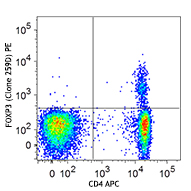
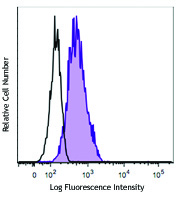
Compare Data Across All Formats
This data display is provided for general comparisons between formats.
Your actual data may vary due to variations in samples, target cells, instruments and their settings, staining conditions, and other factors.
If you need assistance with selecting the best format contact our expert technical support team.
-
Purified anti-mouse CD270 (HVEM)
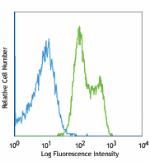
C57BL/6 splenocytes stained with HMHV-1B18 PE -
PE anti-mouse CD270 (HVEM)

C57BL/6 splenocytes stained with HMHV-1B18 PE -
APC anti-mouse CD270 (HVEM)
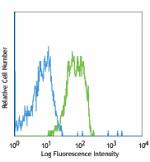
C57BL/6 splenocytes stained with HMHV-1B18 APC -
TotalSeq™-A0885 anti-mouse CD270 (HVEM)
-
TotalSeq™-C0885 anti-mouse CD270 (HVEM)










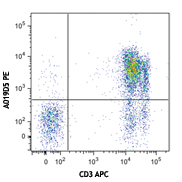



Follow Us